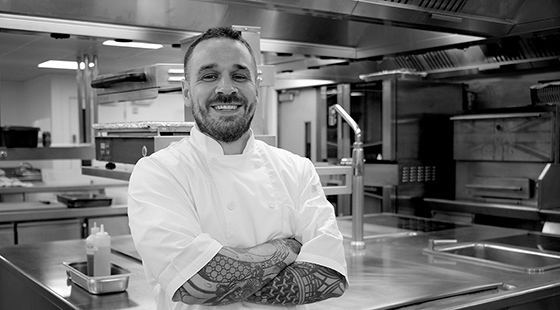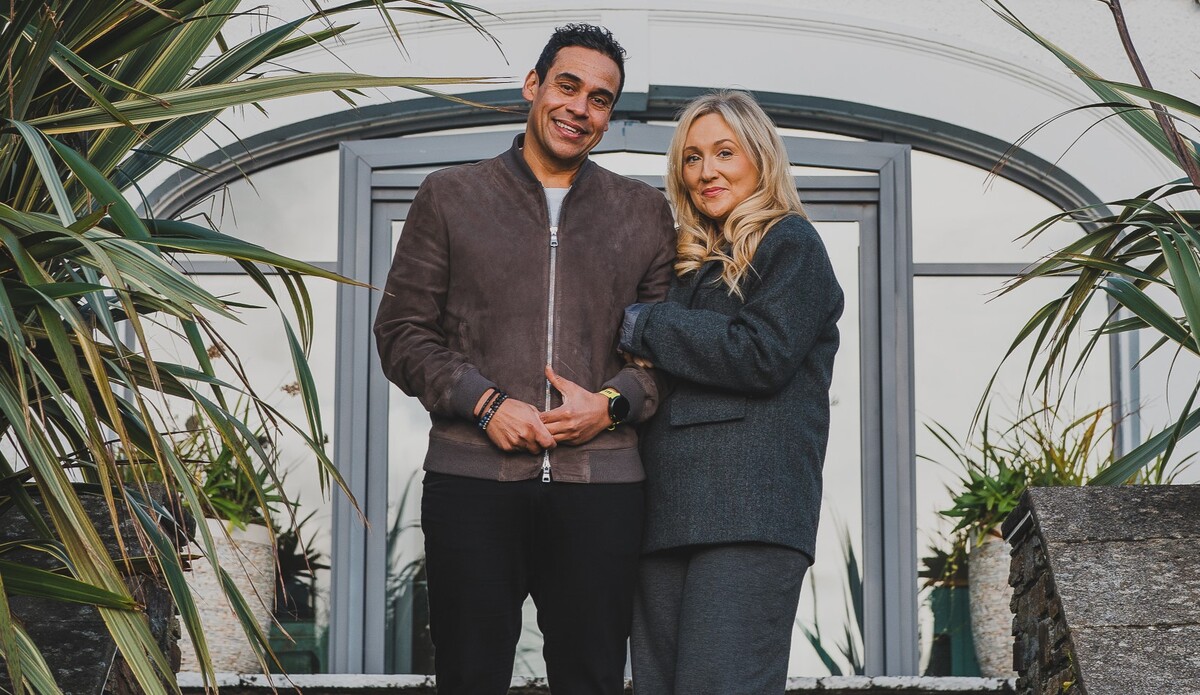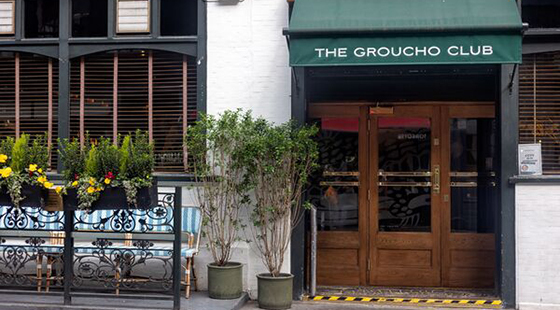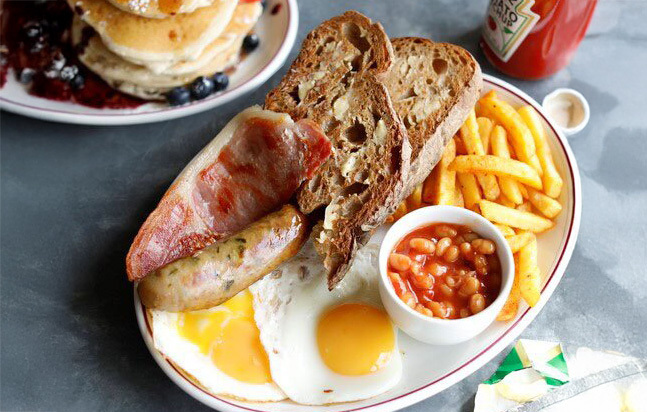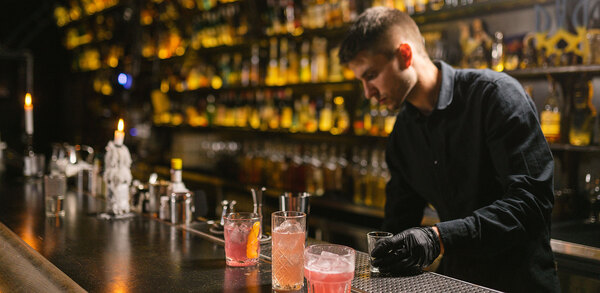Up front: Celebrity general manager Fred Sirieix gets up close and personal with his philosophy for making front of house the star of the show
Fred Sirieix is the very public face of the front of house manager, with several TV shows under his belt and a raft of initiatives to bring waiting staff into the spotlight. And he's using that public platform to preach to the world about how front of house is just as important as back of house, and where the most exciting, satisfying career can be found. Vincent Wood reports
There are few front of house personalities with the profile and prominence of Fred Sirieix. He made his name in the industry in London at Le Gavroche, La Tante Claire and finally at Galvin at Windows, the one-Michelin-starred restaurant high above Mayfair's Park Lane, where he continues to serve as general manager.
More recently, he has burst into the public consciousness through TV shows such as Channel 4's First Dates, where he acts as the charming maître d' and matchmaker, and BBC Two's My Million Pound Menu
"The era of the front of house has come," he says. "The food is still there and it is still very important - I will not say that the food is not important - but I think that it's on par. If you have mediocre food, front of house can make it taste good, but equally, front of house can make mediocre food taste worse."
Sirieix has been arguing with chefs about who is more important since he was 16 years old and back in France, always returning to the idea that front and back of house are equal parts of the same whole. However, when he took his first steps into hospitality, it was the world behind the curtain that piqued his interest.
"Originally, I wanted to be a pastry chef, but my mum said, you shouldn't be a pastry chef, you should be a chef, pastry is too limited." He went on to study in a catering school with a pristine reputation in Souillac, 130km (80 miles) from his home in Limoges. It was there that he learned the challenge and the thrill that comes with being the face of a hospitality operation, in making customers feel like kings and of two days never being the same. In his first year he worked a two-month placement under a maître d' who happened also to be called Frederick.
"One night he said to me, âOK Fred, you're going to be running the section, you're in charge'. I've got a vague memory of him then turning away and going back into the kitchen, and by the time he came back, it was mayhem. I had lost control of the room in a big way. He said: âThis is complete chaos, I need to take over, I need to take control'. I eventually got it back on track but I had turned red - I was not lazy, I was working hard, I just didn't know how to do it. But Frederick was good, because the next day he said, âOK, we do it again'. And I didn't fuck it up. But Jesus, that was a scary night, I will remember it all my life."
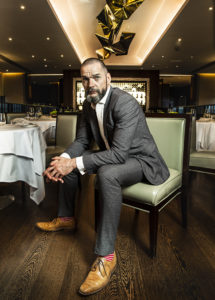
"You have to see, smile, say hello to people before they see, smile, say hello to you," he says. "It is very simple. That's what I want and it is not negotiable." When asked how he balances this finely tuned machine, to make the hospitality stand out in a way that is regimented and yet individual, he says it all comes down to culture and treating his approach to service as a mantra.
"Coca-Cola still advertises, and that has been going for 100 years. The church has been going for more than 2,000 years, but every single day, everywhere in the world, they conduct mass. And why do they do that? Because they want to share the values of Christianity. If you want a message to be understood and to be shared, you need to constantly repeat it. So what we do is exactly that, we keep preaching from the art of service book."
Indeed, Sirieix has written a book, Secret Service, and he offers training courses on the art of front of house through his website, as well as a âGood Service Charter'.
While Sirieix's TV work may have brought a few new customers through the door, the scrutiny that comes with being one of the nation's most identifiable general managers does not seem to faze him or his team. "It puts even more pressure on, but it's a good pressure, because you can't just be on TV and do crap here. It gives more motivation to be even better than we are, because we need to deliver the goods. I think the focus for us is about quality and making sure we deliver."
Tackling the skills shortage
It takes an immense amount of skill and training to create a culture and style that offers customers undeniable quality - so the notion that his team and his profession could be considered low-skilled clashes with him. Sirieix is politically minded, regularly chiming in on shifts in policy on Twitter. As a man of the industry and a Frenchman who has lived in Britain for 27 years, the government's proposal for an immigration system that sees the majority of hospitality workers as being classed as low-skilled and low-priority clearly irks him.
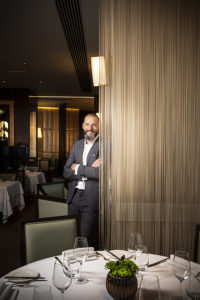
The skills shortage gripping the industry is affecting front of house as heavily as it is the kitchen - and Sirieix believes that if the government isn't willing to recognise the work that goes into producing world-class hospitality, it is unlikely to recognise the need to better fund training in it.
"We have 240 catering colleges in the UK and from of all of those colleges you can't actually fill the workforce for the country. We don't value the industry. The fact that the government has only very lately labelled the industry as low-skilled is just a statement of intent. If you think that something is low-skilled, that it is below or beneath you, you are not going to invest in it because you do not value it. So there will be no proper funding for catering colleges, there will be no overhaul of the qualification system, there will not be a top-down approach to the solutions we need to find."
The other side of the staffing crisis coin is migrant labour. Over the past 13 years he says he can count the number of British applications he has received for front of house roles on his fingers.
He explains: "Here in England we have a very different relationship with the hospitality industry, we have very much an upstairs-downstairs sort of relationship. We wrongly think that if you are in hospitality you are a servant - and nobody wants to be a servant, everyone wants to be a master. But it's completely not the case. And unfortunately, this is why we are in the state we are."
However, it is not just British applicants who are dwindling in numbers. "We are known in the industry for what we do, for being passionate people who believe in what we do, for enjoying it - and so the word travels. The problem now is we also do not get so many Europeans, so finding staff from Europe or other parts of the world is becoming harder."
Brexit clearly weighs on him in all directions. He is personally having to apply for settled status, which he calls a kick in the teeth, while suppliers have been in touch to tell him prices will rise if the UK and Brussels can't broker a deal. On top of this is his desire for the country to do well - much like many of the migrants who have made the UK their home.
"I live in the UK, my children are British, I want the UK to prosper and, if it was a good idea, I would say so. I didn't think it was a good idea then, and I think it's even less of a good idea now that I know more of the facts. I mean, it's like we're arguing for bronze or silver, but we are denying that gold exists."
Voice of the industry
As much as Sirieix is a man with complaints on the treatment of the sector, he believes he is also one with answers. Sometimes he veers into the language of a manifesto, calling for service charges to be deemed part of total earnings by banks, for the government to make a more coherent education system for hospitality, for better funding for professional training.
But he has also worked to take action, launching a National Waiters' Day to highlight the strength of the industry and working with prisons to launch restaurants and give inmates new skills.
He currently runs a workshop, dubbed the Right Course, in HMP Belmarsh in Thamesmead, but he is looking for more places to spread his knowledge, as "we have a blueprint now that works." He adds: "Obviously, it's about the vision, the education and the delivery on the ground, but all prisons have restaurants or staff restaurants. When you have four walls and some tables and chairs, that's it, you've got a restaurant. It's about running it with the same vision and values you have at the Ritz, at Galvin at Windows or at a roadside café. You are trying to make people feel special and you want to deliver a quality experience. Doing it like you care. This is what it's about."
In many ways, Sirieix's TV work replicates the rise of the celebrity chef over the past 20 years, which saw back of house take on a new air of cool. As far as he is concerned, this was important step, but he stresses that front and back are utterly co-dependent.
"Albert Roux famously described the UK as a culinary desert when he arrived here. And we needed the celebrity chef to bring up the standard, but now that we have the standards, let's just embrace the new. Let's come together.
"A restaurant is like a cake - but the food is only one slice of the cake. Because of the rise of the celebrity chef, it began to look like it was the main part of the cake. But now there are so many restaurants and the quality is so high, that it is a given that the food is going to be good. A restaurant is so much more. Look at Galvin at Windows and what strikes you first is what it's like on the inside. Now this would be very different depending on who is here - if it was me, if it was somebody else. It depends on the culture and experience and it's about how a restaurant can make you feel. The food can make you feel very good, but if it's just a plate of food plonked in front of you, it doesn't mean anything."
The next episode of BBC Two's My Million Pound Menu will air at 8pm on 4 February
On making My Million Pound Menu
Sirieix once said that he had entered the world of TV "because it sounded fun", and his joy is still clearly there, despite the demands of the medium.
"When you think of doing a season in a restaurant, a summer season where you work hard with no days off - the shoot for My Million Pound Menu was just like that. My experience of TV was limited, but that was a hard, hard slog."
The programme follows low-level operators - food trucks, market stalls and pop-ups - as they seek investment. While the success of the last series spurred on the second, the most recent incarnation has taken a slight twist, focusing more on the people instead of their ideas.
"I think this series is much better because we get to know the people we are following - we go more in-depth, we understand them, it's much more emotional. And this is what the investors see. These are the people they are going to invest in, and you don't just invest in an idea."
The show uses Manchester as its backdrop, and Sirieix has embraced the city. "We are so London-centric - the UK is not just about London. In Manchester the people are so friendly; they say hello in the street, they all go to drink. I like the Mancunian."
Sirieix's next TV project, another competition, will see a different kind of contestant. CBBC's Restaurant Dream Team is born from his own idea and will see him team up with chef Allegra McEvedy to offer children aged between five and nine the challenge of running their own restaurant, from cooking to front of house and marketing.
"I think it's important that we showcase the industry like that. I think it will be good for the kids because it's going to be difficult, but when they finish and they get it right, there's going to be a great sense of satisfaction and they're going to learn a lot.
"But also it's going to show the public that this is what it is. We have to reach out to them, otherwise they'll never know what's good. And they may come into the industry and not like it, or they may like it, but this is how we're going to get more talent."
Get The Caterer every week on your smartphone, tablet, or even in good old-fashioned hard copy (or all three!).




